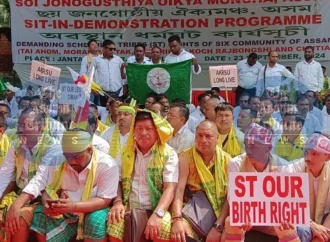The Assam government has launched one of its biggest eviction drives in recent years. It targets encroached land in Eastern Assam’s Golaghat district. The first phase started Tuesday and will affect nearly 2,000 families. Over 1,500 security personnel are on site to oversee the operation. Massive Eviction in Golaghat District Officials say around 15,000 bighas
The Assam government has launched one of its biggest eviction drives in recent years. It targets encroached land in Eastern Assam’s Golaghat district. The first phase started Tuesday and will affect nearly 2,000 families. Over 1,500 security personnel are on site to oversee the operation.
Massive Eviction in Golaghat District
Officials say around 15,000 bighas (about 4,900 acres) of land in the Rengma Reserve Forest at Uriamghat has been occupied illegally. Almost 2,700 families, mostly Bengali-origin Muslims, have been living there.
The government plans to carry out the eviction in two phases. The first phase will displace about 2,000 families.
A district official said, “The forest department divided the area into nine blocks. They gave residents seven days’ notice to leave.”
Strong Security Measures in Place
Authorities have deployed over 1,500 personnel, including police, commandos, and forest guards. This step aims to keep the eviction process peaceful.
The state government says the drive is needed to stop what it calls a “demographic invasion.”
Government’s Position on Eviction
Chief Minister Himanta Biswa Sarma has stressed that illegal settlements threaten the region. He said encroachers cleared forests to grow betel nuts. The government wants to protect Eastern Assam from such activities.
He added that settlers mostly came from Central and Western Assam, mainly Bengali Muslims.
Communities Affected by Eviction
Besides Bengali-origin Muslims, other groups will also face eviction:
-
42 Manipuri Muslim families
-
92 Nepali families
However, 150 Bodo families will remain because they hold forest rights under the 2006 Forest Rights Act.
Local MLA Biswajit Phukan said lawful compensation might be offered to families living there before 1971. Yet, the eviction will continue.
Border Concerns with Nagaland
Since the site borders Nagaland, its government has raised security. Police and administrators now guard the border. They want to stop evicted families from entering Nagaland.
Moreover, the Niki Sumi faction of the National Socialist Council of Nagaland (Khaplang) accused Assam of using the eviction to occupy disputed land.
Why This Eviction Matters
This eviction is part of many similar drives in Assam. Critics argue they mostly affect minority communities. However, the government insists it protects land and demographics.
This operation could lead to major social and political consequences soon.

















Leave a Comment
Your email address will not be published. Required fields are marked with *